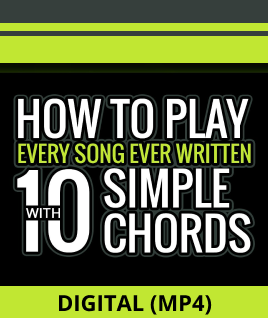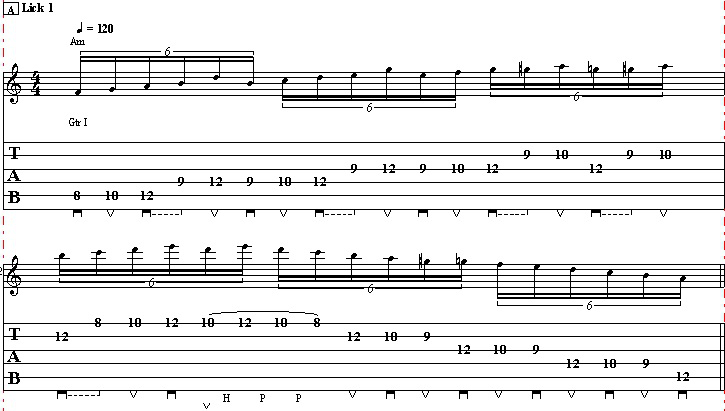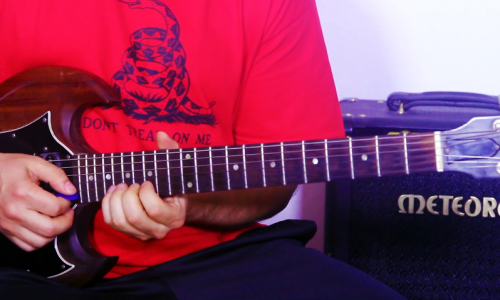Led Zeppelin Good Times Bad Times Guitar Lesson
Today Robert Baker shows us how to play “Good Times Bad Times” by the great Led Zeppelin. His focus will be on the main riffs, he won’t be covering the solo because he did that in another video covering 3 classic Jimmy Page pentatonic licks. So be sure to check that out!

Step 1: Breaking Down The Riffs
First we just start with a normal bar chord. Starting with an E major bar chord, to play this chord you bar with your pointer on the 7th fret 5th string all the way down to the 1st string. Then hold down an open A major shape with your ring finger, barring the 4th, 3rd, and 2nd strings. This is a little tricky because you must bar these notes but also be sure not to mute the high e as it should ring out as the note your pointer finger is holding down by barring, so letting the 5th fret 1st string ring out as part of our E major bar chord. And we include the open 6th string because it’s an E and this is an E major chord. Strum this chord twice. It does this for a while in the beginning and is very powerful to have such a strong simple rhythm so play it with lots of confidence.
Then move two frets down to the D5 power chord, so now your root is the 5th string 5th fret. So pointer on the 5th string 5th fret, ring finger on the 7th fret 4th string, and pinky right under your ring finger also in the 7th fret but on the 3rd string. So we make this shape but don’t strum it, instead we pick a little lick within it.
Arpeggiating it at first picking the 5th string, to the 3rd, to the 4th, to the 3rd, to the 4th, to the 3rd. Then picks the open 4th string, then place your pointer down on the 4th fret 4th string and pick, and then pick the 7th fret 3rd string. Then chromatically pick the 4th fret with your pointer, 5th fret with your middle and 6th fret with your ring finger all on the 5th string back to the E5 power chord rooted on the 7th fret 5th string.
It is very Classic Jimmy Page to always have a million tracks going, but we’re just going to play one part. Start with a power chord on the 4th fret 6th string which is a G#/Ab hold that note with your pointer and then ring finger is on the 6th fret 5th string and pinky on the 6th fret 4th string.
Then slide this chord up one fret to the A5. So keep the same shape and just move each finger up one fret, so now your pointer is on the 5th fret 6th string, ring finger on the 7th fret 5th string, and pinky on the 7th fret 4th string. Now slide that A5 to a D5 also on the 6th string so your fingers are now pointer on the 10th fret, ring finger on the 12th and pinky on the 12th.
Then go to the 5th fret 6th string, make the A5 power chord and slide it up 2 frets to a B5 now holding down the 7th fret 6th string with your pointer, the 9th fret 5th string with your ring finger, and the 9th fret 4th string with your pinky. So the A5 sliding to the B5 fills up two measures.
Step 2: Robert’s Favorite Riff
Now for Robert’s favorite riff of this whole song. Starting with an F#5 on the 6th string 2nd fret with our pointer and holding down the 5th string 4th fret. Strum twice and then you’re going to do a few double stops. For both double stops we bar one fret and hold down both the 4th and 3rd strings with the same finger. In this case he goes 11th fret to 9th back to 11th. On the 11th fret he uses his ring finger and on the 9th his pointer.
Then slide down and do two more double stops holding down the 4th and 3rd strings on the 4th fret with your 3rd finger to the 2nd fret with your pointer on the same stings and then back to the 4th fret. Then repeat! When you come out of this riff you’re going to go into a B5 power chord on the 6th string 7th fret holding down that note, which is the root,with your pointer and the 5th string 9th fret with your ring finger and pinky on the 4th string 9th fret, strum for 8 eighth notes, so one measure. Then move up a whole step to the C#5 moving your fingers to pointer on the 9th fret 6th string, ring finger on the 11th fret 5th string and pinky on the 11th fret 4th string. Also strum this chord for 8 eighth notes, so one measure. Then he ventures into the solo.
Step 3: Leading Into The Solo
To lead into his solo he starts out with E minor pentatonic. To play this scale on the 6th string you play the 12th and 15th frets, on the 5th, 4th, and 3rd strings you play the 12th and 14th frets, and on the 2nd and 1st strings you play the 12th and 15th frets. We’re just going to cover the opening lick, because remember there is more if you check out Robert’s other video, 3 Classic Jimmy Page Pentatonic Licks.
So first bend the 14th fret 3rd string, then pick the 12th fret 2nd string and then 12th fret 1st string. This is a very classic blues lick and a very classic Jimmy Page lick. Repeat this a bunch of times, you have definitely heard this lick in a million different blues and classic rock songs and even hard rock songs. The cool thing to take from it is to see the different variations different players do with it. At 5:29 Robert shows you how to play this lick and then shows his own E minor pentatonic improvised licks attached to it. So feel free to do your own.
Recap: How to Play Good Times Bad Times
I hope you enjoyed learning how to play “Good Times Bad Times”. Jimmy Page is an amazing guitarist and Led Zeppelin has to be arguably one of the best bands of all time, so what better band to learn from! Enjoy picking up on some techniques Jimmy throws in and try and take note of the little things he does to make ordinary power chords become timeless classic rock hit songs.
Click Here to Learn More



